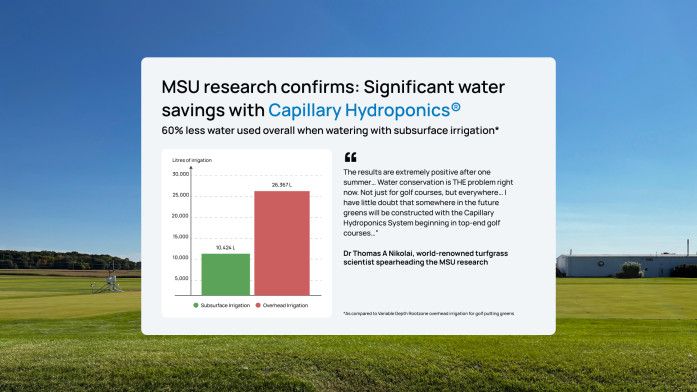
Data from Michigan State University's Hancock Turfgrass Research Center also reports no significant difference in playability between the Capillary Hydroponics system and Variable Depth Rootzone greens.
WELLINGTON, FL / ACCESSWIRE / January 25, 2024 / CapillaryFlow, a global leader in turf management innovations, is excited to announce ground-breaking results from a study conducted at Michigan State University's Hancock Turfgrass Research Center. The research, which is continuing, is focused on comparing CapillaryFlow's Hydroponics subirrigation system with the Variable Depth Rootzone overhead irrigation for golf putting greens.

60% less water used overall when watering with subsurface irrigation
The study
Initiated in June 2022, the study aimed to evaluate the differences in water consumption and soil moisture retention between Capillary Hydroponic System and Variable Depth Rootzone overhead irrigation for putting greens. Data collected included green speed, surface firmness, clipping yield, pest observations, nutrient holding capacity, organic matter build-up, and drainage water nutrient content.
Key findings
- Capillary Hydroponics used 60% less water over a 10-week period starting June 2023 than the Variable Depth Rootzone system.
- In context-specific scenarios involving precipitation and evaportanspiration rates, the Capillary Hydroponic System used between 42% and 83% less water than the Variable Depth Rootzone system.
- There is no significant difference in playability between the Capillary Hydroponics System and the Variable Depth Rootzone greens concerning green speed or surface firmness.
For details, click here.
Revolutionizing turf management
Martin Sternberg, founder and CEO of CapillaryFlow, expressed confidence in the results. "Sub-surface irrigation is significantly more effective than overhead irrigation," said Sternberg. "These findings validate our commitment to water conservation and the efficiency of our hydroponic system. We believe this technology can revolutionize turf management globally."
"The results are extremely positive after one summer," said world-renowned turfgrass scientist Dr Thomas A Nikolai, who is spearheading the MSU study. "Water conservation is THE problem right now. Not just for golf courses, but everywhere… I have little doubt that somewhere in the future greens will be constructed with the CHS beginning in top-end golf courses…"
He added: "The reason for my confidence is the need to avoid wasting water by utilizing it more efficiently and the fact that we are performing scientifically sound replicated research which will lead to answers for future managers of the system."
The future
Sternberg is optimistic about the golf industry's shift towards sub-surface irrigation. "Our goal is to use this technology to prove the golf industry's worth and benefit to society. Despite driving innovations for decades, the golf industry has not received credit. I am optimistic that we can leverage it to change the public perception of the sport's impact on the environment."
These results are not just promising for the golf industry but also signify a potential game-changer in sports turf management. CapillaryFlow remains committed to pushing the boundaries of sustainable turf solutions, contributing to a greener future.
Contact Information
Johan Setteryd
COO
johan.setteryd@capillaryflow.com
+46 70 756 26 16
SOURCE: CapillaryFlow
View the original press release on newswire.com.
